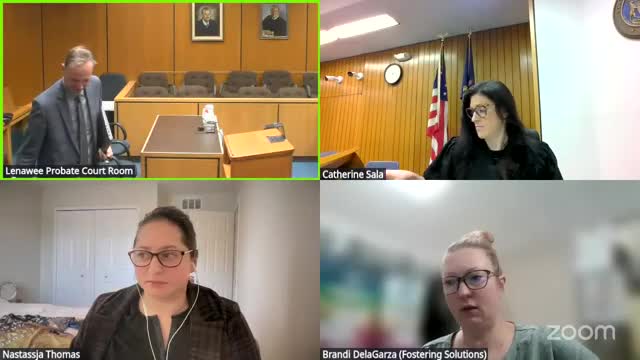Court adopts case service plan, keeps reunification goal in Lenawee County juvenile hearing
Get AI-powered insights, summaries, and transcripts
Subscribe
Summary
The Lenawee County Probate & Juvenile Court adopted a proposed case service plan, kept reunification as the permanency goal for a child in foster care, ordered supervised parenting time and set a review hearing for May 6; the child's mother remains early in sobriety and has pending criminal matters and drug‑screening requirements.
At a hearing in Lenawee County Probate & Juvenile Court, the court adopted the department's proposed case service plan and left reunification as the permanency goal for a young child now placed with grandparents on both sides.
The caseworker, Brandy Delagarza, a foster care worker with Fostering Solutions, told the court the department's permanency goal for the child is "reunification," and described barriers including the mother's recent location after an earlier period when she could not be found, ongoing substance‑use concerns, pending criminal matters and the need for housing, income and a psychological evaluation. The court accepted the caseworker's report and attachments into the record and incorporated the case service plan into today's order as the measure for future review.
The caseworker said the child, who entered care in September 2024, has been doing well in Head Start and in his current placement with grandparents. Katharina DuMont, the child's court‑appointed guardian ad litem, said she met the child and that "he's doing well." Delagarza reported the mother, Victoria DeHart, has begun supervised parenting time and that the notes from a recent visit indicated no immediate concerns.
The court heard that the mother has begun engaging with some services but remains early in recovery. Delagarza told the court the mother completed a screening on Jan. 29 and that probation-ordered testing had produced a positive result for Suboxone and THC on Feb. 5; Delagarza said she does not have confirmation of a prescription. In testimony, the mother, Victoria DeHart, said, "I have not been on Suboxone," and agreed to continue drug screening and work on the case service plan.
Counsel for the department, Sasha Thomas, moved to admit the department's court report and attachments. No counsel objected, and the court admitted those documents, including items filed Jan. 6, 2025, and filings from November 2024 noted on the record (including a DHS 30 notice). The court also directed the parties to consider family‑therapy providers and asked staff to check with Brene Moore about a parenting reunification program that could provide both parenting reintroduction services and family therapy.
The court ordered parenting time to remain supervised, initially continuing once a week for one hour as the teams "ease into" expanded visits. Delagarza said the department's plan is to continue weekly supervised visits for a few weeks and, if progress is made, increase frequency to twice weekly and then consider further expansion. The court emphasized family therapy to help the child navigate two households and potential conflict between the families.
The court set a review hearing for May 6 at 10 a.m. and stated the case service plan will serve as the metric for assessing the mother's progress toward reunification. The child will remain placed with grandparents pending further review.
Ending: The court directed the department to continue supervised parenting time, pursue scheduled psychological and substance‑use evaluations for the mother, and report progress at the May 6 review hearing. The record includes the admitted department report and attachments, the proposed case service plan and several prior filings incorporated into today's order.
